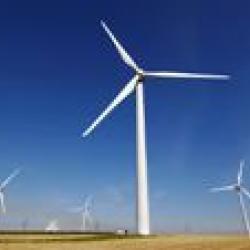Source Institutions
Source Institutions
Add to list Go to activity
Activity link broken? See if it's at the internet archive

In this activity, learners explore how wind energy can be generated on both a large and small scale. Learners design and build a working windmill out of everyday products and learn about anemometers and site testing. Learners' windmills must be able to sustain the wind generated by a fan or hairdryer at medium speed. Learners test the ability of their windmills to rotate and lift a small object upward. Learners evaluate the effectiveness of their windmill and those of other teams, and present their findings to the group.
- Under 5 minutes
- 1 to 2 hours
- $10 - $20 per group of students
- Ages 8 - 18
- Activity, Lesson/Lesson Plan
- English
Quick Guide
Materials List (per group of students)
- Student Resource Sheets
- Student Worksheets
- Hairdryer or fan
- Small object for each team to life (suggestions: toy car, yogurt cup filled with a few coins, tea bag, battery, pencil)
- Wooden stick
- Wooden spoons
- Small wooden (balsa) pieces
- Bendable wire
- String
- Paperclips
- Rubber bands
- Toothpicks
- Aluminum foil
- Tape
- Dowels
- Glue
- Paper
- Cardboard
- Plastic wrap
- Other materials as needed
Subjects
-
Engineering and Technology
-
Engineering
- Environmental Engineering
- Mechanical Engineering
- Technology
-
Engineering
-
Physical Sciences
- Electricity and Magnetism
-
Energy
- Work and Machines
-
Motion and Forces
- Machines
- Momentum and Velocity
- Rotation Motion
-
The Nature of Technology
-
Technology and Society
- Impacts of Technology
- Technology and the Environment
-
The Design Process
- Research and Development
- Invention and Innovation
- Problem Solving
- Troubleshooting and Maintenance
-
Technology and Society
Informal Categories
- Financial Literacy
- Nature and Environment
Audience
To use this activity, learners need to:
- see
- read
- touch
Learning styles supported:
- Involves teamwork and communication skills
- Involves hands-on or lab activities
Other
Components that are part of this resource:
Includes alignment to state and/or national standards:
This resource is part of:
Access Rights:
- Free access
By:
Rights:
- All rights reserved, IEEE,
